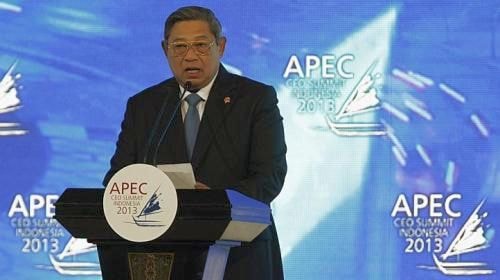APEC 21 Summit: Asia-Pacific Resilience
The 21st Asia-Pacific Economic Cooperation (APEC) Summit opened in Bali, Indonesia on October 7.
Delegates attending the conference discussed trade, economic, security and other regional issues. Taking place in the context of many fluctuations in the world political and economic situation, this conference is an opportunity for member countries to strengthen cooperation and promote sustainable growth.
The 21st APEC Summit took place on October 7-8 with the theme "A Resilient Asia-Pacific: Engine of Global Growth".
 |
| Host country President at the Conference (Photo: Reuters) |
The 21st APEC Summit focused on discussing three key issues: the current global economic situation and APEC's role in promoting the multilateral trading system, the APEC vision on connectivity in the evolving international and regional architecture and sustainable growth associated with equity: food security, water resources and energy.
Speaking at the opening of the conference, Indonesian President Susilo Bambang Yudhoyono stressed the importance of cooperation among the 21 member economies to deal with the global economic downturn.
“APEC member countries need to further strengthen cooperation. Cooperation is the key to help us cope with the negative impacts of the economic crisis,” Mr. Yudhoyono said.
The 21 APEC member countries account for more than half of the world's GDP. The Indonesian President said APEC is ideally positioned to deal with the financial crisis.
The APEC region's economy is forecast to grow by 6.3% this year and 6.6% next year. However, the slow economic recovery in the region and uncertain financial policies in the US are affecting other APEC member countries, especially emerging economies.
Major economies in Asia, especially China, India and Indonesia, have been facing slow economic growth in recent months.
Therefore, the APEC conference is an opportunity to help economies strengthen economic activities for sustainable development.
“I think it is necessary and necessary to recognize that developing economies need to have strong economic growth. Because strong growth in developing economies like Indonesia will facilitate the stability of the global economic outlook,” said Indonesian Trade Minister Gita Wirjawan.
According to some media, a joint statement of the summit will be issued tomorrow, emphasizing the need for structural reforms that will boost productivity, labor force participation and create more high-skilled jobs in the region.
A series of high-level bilateral meetings were also held on the sidelines of today's conference, notably between Chinese President Xi Jinping and Thai Prime Minister Yingluck Shinawatra to strengthen bilateral ties. New Zealand Prime Minister John Kerry also met with leaders of Malaysia, Chile, Peru and Canada.
In particular, the meeting between Russian Foreign Minister Sergei Lavrov and US Secretary of State John Kerry received public attention, focusing mainly on the situation in Syria and Iran./.
According to VOV - DT
